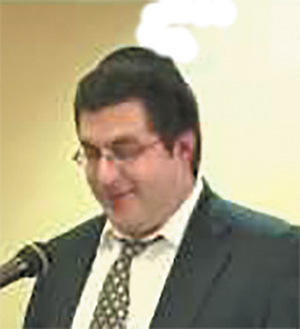
My five-year-old son, Gedalya, whispered a secret to me this morning. I love it when little kids whisper a secret, and it’s not just them breathing into your ear while you wait.
He said, “Daniel [my 11-year-old] thinks we only have a certain amount of words in our lives.”
I’ve heard this before. Every kid has a rebbi who tells him this at some point. Though this seems like something the rebbeim should really take the time to explain, if they’re going to bring it up. Because I’ve never heard of a person who just suddenly runs out of words one day. Though I think it means that when you run out, you die. Like you suddenly get hit by a bus. In mid-sentence. I also don’t know if it means you can accidentally speed through your words by talking to yourself or singing in the shower, though I sure hope not, because neither of those would be good news for me.
I think at least the rebbi should say what sefer he got it from. Because it sounds like something some rebbi came up with to get his class to stop talking.
Wait. Is this why kids don’t say please and thank you? Because it’s extra words? Is this why people in Brooklyn don’t say Good Shabbos?
Though it would definitely explain words like yuntiff, shallashudiss and ksivachsimatova.
But then I got to thinking that maybe there are some words that we can cut. We say expressions all the time that don’t make any sense, or are unnecessary altogether.
For example, take the phrase, “You can say that again.”
I just said it. Why say it again?
In fact, if you’re ever not listening and you don’t want the other person to know, but you also want them to think you agree with them, you can say, “You can say that again.” And then they’ll say it again. Try it with your wife.
Another phrase that accomplishes the same nothing is, “Great minds think alike.”
“Great minds think alike” is something you say when you both agree that there’s nowhere for the conversation to go.
I always like watching two idiots agree on something and then one of them says, “Great minds think alike.” And then they both nod.
The expression isn’t true anyway. Every Gemara disproves that. You never have a Gemara where two amoraim agree, and then one goes, “Great minds think alike.” And then they both nod. In fact, most great minds keep coming up with new amazing things that no one’s ever figured out. That’s the definition of a great mind. If great minds thought alike, two heads wouldn’t be better than one. It would just be twice as much nodding.
We also wouldn’t have expressions like, “That’s a good question.”
Thanks. I thought of it myself.
This is usually something a speaker says when he’s trying to buy time so he can think of an answer. And it works, because, with me at least, I generally don’t hear his answer after that point. I’m too busy congratulating myself for asking such a good question.
And speaking of speeches, what about the phrase, “This person needs no introduction”?
Everyone knows this phrase, as it’s usually said during the introduction. This is right before it suddenly occurs to everyone, “Wait; there’s another speaker?” No matter how good a speech is, the worst part is when you think it’s winding down, and then you realize that the part you haven’t heard is longer than the part you have.
It happens to be that after the speaker says that, he always continues with the introduction. He should just get up and say, “This person needs no introduction,” and then sit back down. People want to hear the speech; they don’t want to hear the introduction. And usually the guy giving the introduction doesn’t want to be giving it either. The only person who wants the introduction is the person being introduced, because he doesn’t want to just walk out onto a stage and start talking while wondering if anyone has any idea who he is. And you, the emcee, were like, “You need no introduction,” and he said, “Yes I do,” and now you have to do it, but the good news is you can still get the last word in on this argument, because you can stand in front of the crowd and say, “This person needs no introduction,” and it’s not like he’s going to stick out his head from behind the curtain and go, “Yes I do!”
And speaking of yelling things out, how about when people say, “I just sat down!” People always seem mad about this, like it’s your fault they just sat down. And this is always a conversation closer, never an opener.
“So vuss machst de?”
“I just sat down!”
Or: “I’d like to call up this person, who needs no introduction.”
“I just sat down!”
People always yell this. And it’s usually people who require sounds effects and several small kids pulling each other to get them up.
I guess my point is, as they say, “Don’t be sad; others have it worse.” And they said it. I didn’t say it. Because if anything, this would not cheer me up. It would make me sadder to know that other people have it worse. Isn’t that expression selfish?
“Ha ha, they have it worse!”
Why is this a reason not to be sad? Isn’t that like saying, “Don’t be happy; others have it better!”?
Um, that’s a good question.
By Mordechai Schmutter
Mordechai Schmutter is a freelance writer and a humor columnist for Hamodia, The Jewish Press and Aish.com, among others. He also has five books out and does stand-up comedy. You can contact him at MSchmutter@gmail.com.









